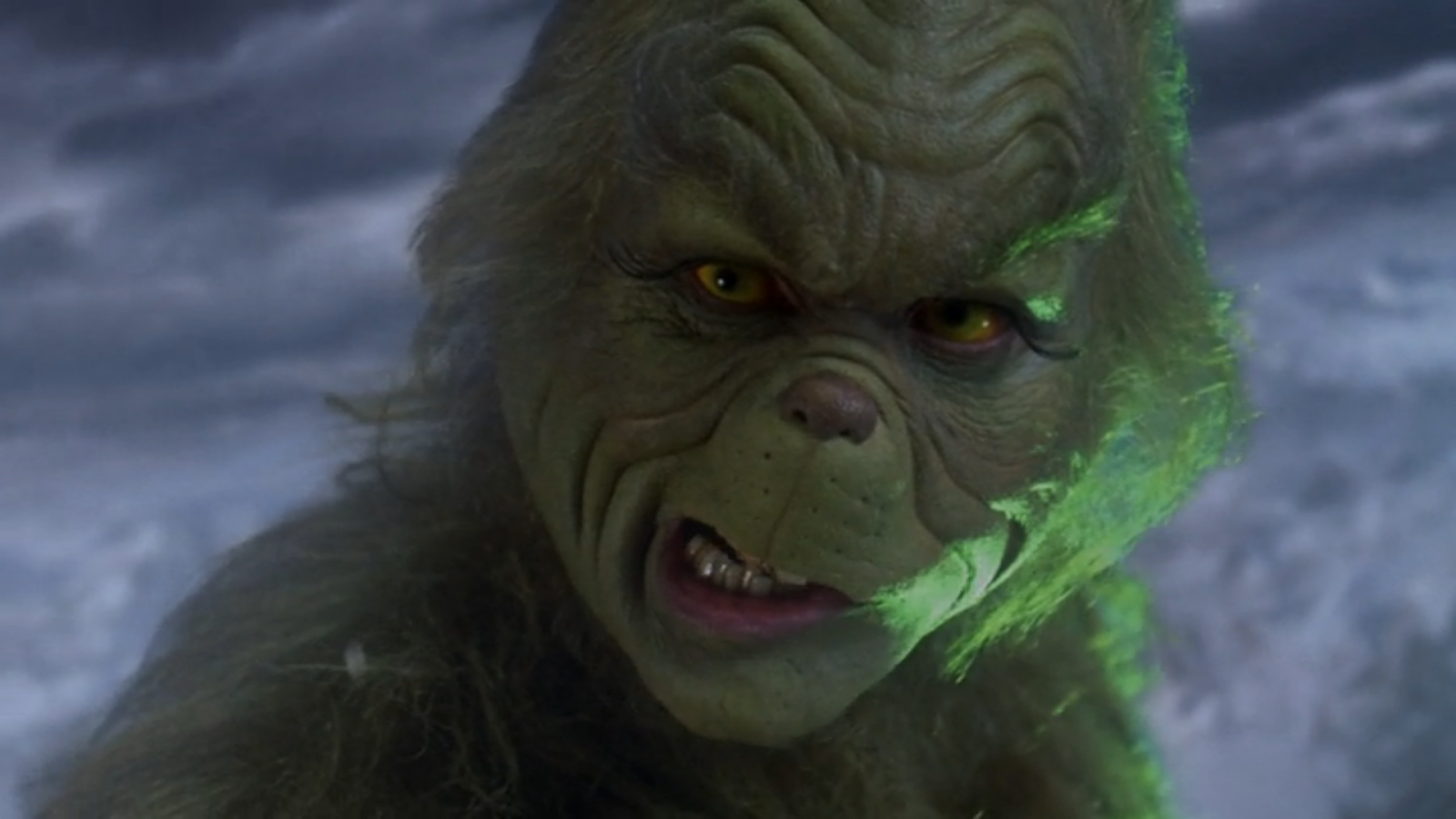
By Andrew Jenck
We all take part in our own holiday traditions every year, usually including watching classic movies and specials; some are mainstays, others are hidden gems. One common occurrence is less appreciation and more of conviction: 2000’s How the Grinch Stole Christmas. Twenty years since it’s release, it’s become engraved into the yearly rotation, though not without criticism. Being the first feature length adaptation of a Dr. Seuss book, this started the trend of the timeless stories being turned into dated pieces of media with ill-placed adult humor, plots fluffed to reach 90 minutes, and overly relying on celebrities. Unlike the later films which either fell off to obscurity or infamy, The Grinch is somewhat beloved. I’ve never been a fan of this film since it’s release, yet something draws me to it each Christmas; never putting my finger on how it both interests and frustrates me…until now.
Seeds of compelling themes are present and that could have expanded the story naturally. Part of the Grinch’s cynicism towards Christmas because his home is the Whos’ dump, receiving all the discarded presents. He sees the holiday as solely commercial with no lasting appeal. I can somewhat understand the inclusion of the anti-prejudice theme, as it was present in several of Seuss’ work, though not in the original book. Unfortunately, these ideas are lost in translation through blatant execution.
Whereas Seuss’ book was nuanced but accessible, this film is blatant and confused. Recall what I praised about Olive the Other Reindeer, for portraying a cynical worldview but still optimism. The Grinch goes full cynicism but still calls for redemption. Whoville is portrayed as a materialistic nightmare with the residents enjoying the chaos and over-spending is celebrated. Their characterization is inconsistent as they’ll listen to Cindy Lou’s plea to accept the Grinch but still mock him at every chance. I understand the mayor fuels much of this bigotry, much like real-life politicians, but they’re too lenient. Mr. Grinch is still a mean one but the Whos almost always insult him first. I’m tempted to say this version should’ve had the presents destroyed, and the Whos actions be more consequential.
An anti-racism message can benefit from one-dimensional bigots, but it also needs more nuanced characters uneasy with society’s prejudice but unsure whether to fully break away from it. Martha May is intended to be this character, but she’s given little personality besides being part of an pointless love triangle. Most of the characters are ironically stereotypes that were overused even at the film’s release: the full-of-himself mayor, the foppish assistant, the clueless dad, etc. Many of whom don’t get enough screen time for proper development. The audience can’t learn anything substantial when everyone’s exaggerated; they won’t see themselves therefore their flaws in the characters.
Ron Howard is a competent director, but he surprisingly overcompensates and underperforms here. He mostly shoots at a Dutch angle to emphasize Whoville setting on a snowflake but that grows monotonous quickly. Maybe have Dutch shots when the Grinch is on screen distorting the Whos’ lives. A lot of care in the set designs, but the lighting makes everything so artificial, the CGI doesn’t blend well even for 2000, and the camera work made me feel more like I was on the Universal Tram Tour.
As bad as the film can get, however, it’s never bland or lazy. It’s still compelling to watch, as it stumbles while earnestly trying to make something out of the book. Jim Carrey is giving his all as Mr. Grinch, he widely expresses himself through the make up and is so fluid with the costume, he’s like a full body Muppet. The more grounded and cheerful Cindy Lou compliments him well and they do share some heartwarming moments, especially towards the end. Her describing his face as warm instead of hairy is genuinely heartwarming and for once effectively delivers the anti-prejudice message of looking past but also embracing others’ differences.
Having a big name actor and brand recognition, How the Grinch Stole Christmas (2000) was perhaps bound to play excessively each year, but I do think a sizable portion of the appeal comes from how weird and earnest it is. I consider it a bad movie but also engaging and I do at least watch parts of it each year. It’s like a homemade Christmas decoration from preschool: not well-made but has its own charm.


